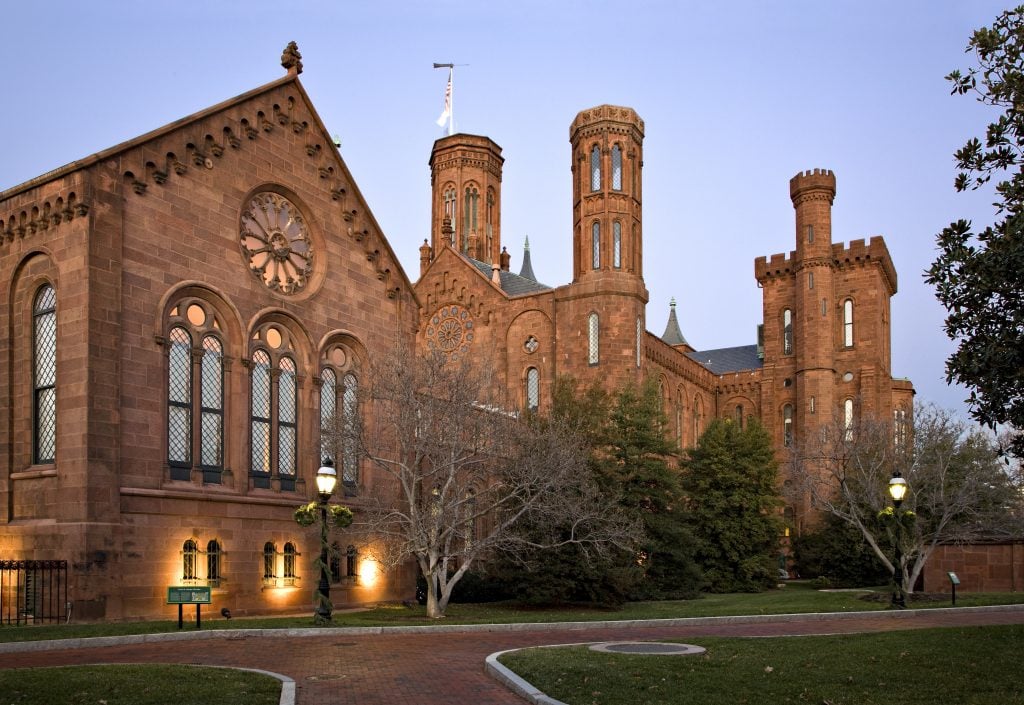Museums & Institutions
Audit Questions Smithsonian’s Use of Pandemic Relief Funds
The institution received $7.5 million in funds but failed to properly justify some purchases.

The institution received $7.5 million in funds but failed to properly justify some purchases.

Adam Schrader

An inspector general audit has questioned some Smithsonian Institution spending under a pandemic relief law, suggesting the group of museums and research centers administered by the United States government did not properly spend some of the Covid-19 relief funds it received as part of the 2020 CARES Act.
Under the act, the Smithsonian Institution received $7.5 million for designated purposes such as deep cleaning, security, information technology, and staff overtime to respond to the impacts of the pandemic. While the Office of the Inspector General (OIG) found that the money was primarily spent for pandemic-related purposes such as purchasing face masks, sanitizing supplies, and IT to enable telework by employees, “the Smithsonian did not consistently spend CARES Act funds in accordance with applicable laws, policies and procedures,” the report said.
The Smithsonian divided the funds between two units: its facilities team and the Office of the Chief Information Officer (OCIO). Smithsonian Facilities received $6 million for personal protective equipment, restroom upgrades, and other measures to fight the spread of the virus in facilities, including museums, research centers, and administrative offices.
The OCIO received $1.5 million to implement mandatory work-from-home orders for nonessential workers as museums closed. The National Museum of Natural History (NMNH) failed to properly track two laptops purchased with the funds, according to a new report from the institution’s Office of the Inspector General, published on February 23.
“For more than a month, [the museum] could not locate one laptop worth $1,594 or a required form assigning responsibility for the laptop to its current user,” the report stated. Meanwhile, an employee with NMNH retained an unneeded laptop worth $1,594 for two years rather than returning it to the unit’s Accountable Property Officer or Property Custodian for distribution to another employee or disposal
Overall, the report focused on tracking 49 of a total of 436 CARES Act transactions made by the institution, comprising about $4.7 million spent of the total $7.5 million in funds awarded. In those transactions, auditors found that the institution failed to adequately justify nine purchases totaling nearly $1.7 million that were solely sourced from a single vendor. Under Smithsonian policy, a sole-source purchase order is one awarded to a vendor without competition and is allowable only under certain circumstances with proper justification.
“Management’s justifications lacked certain details such as why only one vendor was considered and how the price was determined to be fair and reasonable,” investigators said in the report. The investigators interviewed museum officials who had made the violating purchases, who said they believed they had the authority to make sole-source purchases under emergency orders amid the pandemic.
One of the purchases, for $97,125, had no required justification. The other eight that were inadequately justified included five purchases for cleaning services, the hiring of a registered nurse, $346,345 to install antimicrobial tiles in restrooms and locker rooms at various Smithsonian facilities, and hand sanitizer.
“Two of the five purchase orders for cleaning services were awarded to the same vendor, resulting in one vendor receiving $745,390—approximately 10 percent of the Smithsonian’s total CARES Act funding,” the report stated.
Furthermore, the institution did not follow procedures to seek competition from at least three vendors to buy 190,000 face masks and 3,800 bottles of hand sanitizer for $502,738 using purchase cards. And, the Smithsonian Institution improperly charged $28,999 to the CARES Act, including manual water fountains, printing supplies, a phone case, and a fire safety guide.
“Additionally, a medical doctor charged 100 percent of their salary to the CARES Act even though they performed duties unrelated to Covid-19. Smithsonian management corrected these transactions during the audit,” the investigators said.
The auditors stated the importance of tracking pandemic relief funds after high-profile cases of fraud and misuse by other government agencies have landed in the headlines.
The Smithsonian Institution did not respond to a request for comment by press time. The report noted that Smithsonian management termed the purchases for items not related to the pandemic as simple mistakes, and agreed with recommendations to strengthen controls.
The institution’s financial statement for 2020 shows it had used $4.5 million by September 30, 2020, just months after the CARES Act passed. “The Smithsonian’s free admission model, coupled with this federal support, makes the Smithsonian less vulnerable to the financial impact of public closures than much of the cultural sector,” the Smithsonian Institute said in its 2020 financial report.